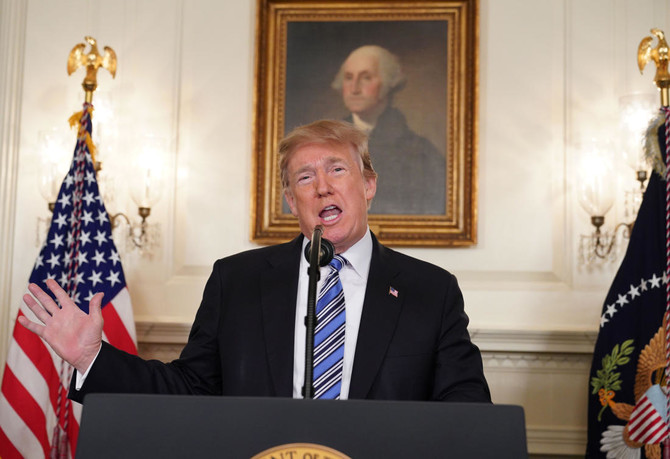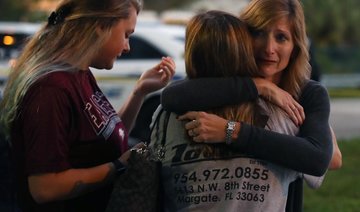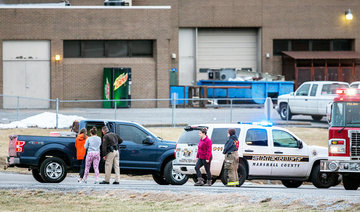WASHINGTON: President Donald Trump struck a solemn tone Thursday after the deadly school shooting in Florida, describing a “scene of terrible violence, hatred and evil” and promising to “tackle the difficult issue of mental health,” but avoiding any mention of guns.
Taking up the now-familiar ritual of public consolation after terrible violence, Trump spoke from the White House Diplomatic Room. In a slow, deliberate style, he sought to reassure a troubled nation as well as students’ families and shooting survivors in Florida.
“We are all joined together as one American family, and your suffering is our burden also,” Trump said. “No child, no teacher, should ever be in danger in an American school.”
Trump, who owns a private club in Palm Beach, Florida about 40 miles from the town of Parkland, where the shooting happened, said Thursday he was making plans to visit the grieving community.
He did not answer shouted questions about guns as he exited the room.
The president’s address came a day after a former student opened fire at the Parkland, Florida, high school with an AR-15 rifle, killing 17 people and injuring 14 more. It was the nation’s deadliest school shooting since a gunman attacked an elementary school in Newtown, Connecticut, more than five years ago.
At the Capitol, the usual divisions over gun laws were evident.
House Minority Leader Nancy Pelosi, a California Democrat, said in a statement that it is time for action. “Congress has a moral responsibility to take common-sense action to prevent the daily tragedy of gun violence in communities across America,” she said. “Enough is enough.”
Senate Majority Leader Mitch McConnell, a Republican from Kentucky, did not mention guns as he said the Senate would observe a moment of silence at noon. “To say that such brutal, pointless violence is unconscionable is an understatement,” he said.
Before he was a candidate, Trump at one point favored some stricter gun restrictions. However, early in his administration, he told the National Rifle Association he was their “friend and champion.” He signed a resolution passed by the GOP-led Congress blocking an Obama-era rule designed to keep guns out of the hands of certain mentally disabled people.
Trump on Thursday praised teachers and first responders and also offered a direct message to children.
“I want you to know that you are never alone and you never will be,” Trump said. “You have people who care about you who love you and who will do anything at all to protect you. If you need help, turn to a teacher, a family member, a local police officer or a faith leader. Answer hate with love, answer cruelty with kindness.”
Trump also pledged that his administration would work with state and local officials to improve school safety and to “tackle the difficult issue of mental health.”
He later added that “it is not enough to simply take actions that make us feel like we are making a difference, we must actually make that difference.”
Trump, who did not speak publicly immediately after the shooting, weighed in on Twitter early Thursday, calling the suspect “mentally disturbed” and stressing it was important to “report such instances to authorities, again and again!” He tweeted about the shooting twice on Wednesday, expressing condolences and saying he spoke with Florida’s governor.
The president also issued a proclamation mourning the victims and ordering American flags at public buildings across the country flown at half-staff.
Trump has offered consolation before after horrific violence. A mass shooting in Las Vegas last year was the deadliest in modern history, with a gunman killing 58 people and injuring hundreds more, before killing himself. And a shooting in a Texas church in November left more than two dozen dead.
He has largely focused on mental health as a cause for mass shootings, dismissing questions about gun control.
After the Texas church shooting, the president said, “This isn’t a guns situation.” When he visited Las Vegas to mourn with the families of those victims, Trump called the shooter “demented” and a “very sick individual,” though he added that “we’ll be talking about gun laws as time goes by.”
The 19-year-old suspect, Nikolas Cruz, is a troubled teenager who posted disturbing material on social media. He had been expelled from Marjory Stoneman Douglas High School for “disciplinary reasons,” Broward County, Florida, Sheriff Scott Israel said.
Mayor Beam Furr said on CNN that the shooter was getting treatment at a mental health clinic for a while, but that he hadn’t been back to the clinic for more than a year.
While Trump has offered sober responses to some tragedies since he took office, he has also drawn criticism for more inflammatory reactions to acts of violence.
After the Orlando shootings at a gay nightclub that left 49 dead, he tweeted, “Appreciate the congrats for being right on radical Islamic terrorism.” In the wake of a deadly terror attack in London in June, he went after the Mayor Sadiq Khan on Twitter, suggesting he wasn’t taking the attacks seriously enough.
Trump cites mental health in shooting, no mention of guns
Trump cites mental health in shooting, no mention of guns

Afghanistan launches retaliatory attacks on Pakistan as tensions escalate

- At least 66 Afghans have been killed by Pakistan’s strikes, Afghan authorities say
- Afghanistan has called for dialogue while Pakistan ruled out any talks with Kabul
KABUL: Afghanistan has launched new attacks on Pakistan’s military bases, the Afghan defense ministry said on Saturday, as cross-border clashes escalated between the neighbors after months of tension.
The latest flare-up erupted after Pakistan’s airstrikes on Afghan territory last weekend triggered a retaliatory offensive from Afghanistan along the border on Thursday.
The two countries have engaged in tit-for-tat attacks since, marking the most serious development in ongoing tensions between the two countries, which agreed to a ceasefire last October following a week of deadly clashes.
Afghanistan’s Air Force has “once again launched airstrikes on Pakistani military bases” in Miranshah and Spinwam, the Afghan Ministry of National Defense said on X on Saturday, claiming that the strikes caused “severe damage and heavy casualties.”
“These successful operations were conducted in response to repeated aerial aggressions by the Pakistani military regime,” the ministry said.
Afghan forces also launched similar strikes against military targets in Islamabad and Abbottabad on Friday, which the ministry said was in retaliation of aerial attacks by Pakistani forces in Kabul, Kandahar and Paktia.
At least 66 Afghan civilians, mostly women and children, have been killed in Pakistani strikes, with another 59 others wounded, according to Hamdullah Fitrat, deputy spokesman for the Afghan government.
Pakistan has maintained that it is targeting only military targets to avoid any civilian casualties, in compliance with international law.
Pakistani officials said its forces have killed more than 330 Afghan fighters and targeted 37 military locations across Afghanistan.
Zabihullah Mujahid, chief spokesperson for the Afghan government, earlier called for talks to resolve the crisis.
“We have always emphasized peaceful resolution, and now too we want the issue to be resolved through dialogue,” he said on Friday.
However, Pakistan has ruled out any talks with Kabul.
“There won’t be any talks, there is nothing to talk about. There’s no negotiation. Terrorism from Afghanistan has to end,” Mosharraf Zaidi, spokesperson for Pakistan’s prime minister, said on Friday.
Pakistan is accusing the Afghan Taliban of sheltering fighters from the banned Tehreek-e-Taliban Pakistan and allowing them to stage cross-border attacks — a charge Afghanistan denies, saying it does not allow its territory to be used against other countries.
As international calls for mediation grow amid the escalating hostility, Afghans across the country are growing fearful of the violence.
“Everyone heard the jets. This is the first time since the withdrawal of US invaders that we have heard such a horrible noise and news of damage. It is not good for us,” said Kandahar resident Shahid Zamari.
“We had forgotten the US war and its bad impact on us, on our families, on our children. And now this has come upon us again — by Pakistan, and in the holy month of Ramadan.”
When the strikes hit Kabul at around 1:30 a.m. on Friday, Saleema Wardak moved quickly to wake up her six children and escape outside, assuming the strong jolt that shook her house was an earthquake.
“While standing in the yard, my husband told me it was not an earthquake but an explosion. Then we heard the crazy sounds of planes, and shooting from the mountains against the planes,” she told Arab News.
“We hid inside, worried another bomb would fall on us. People say Pakistan is targeting civilians on purpose to increase pressure on the Taliban. So we hid … The world is unjust … They do not value the blood of the poor.”
For Sabawoon, a 23-year-old student from eastern Kunar province’s Asadabad city, the coming days are filled with uncertainties.
“What to do? Where to go? We have to stay and find our way to survive,” he told Arab News. “God willing, nothing bad will happen to us. If they are bombing us, what can we do?”














